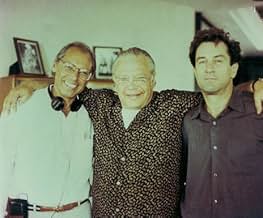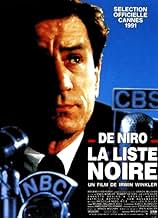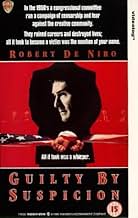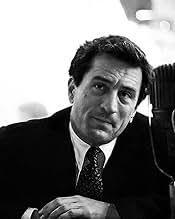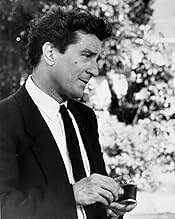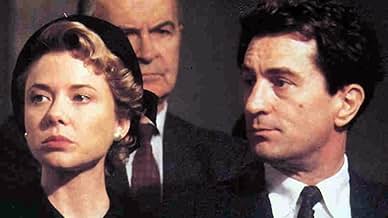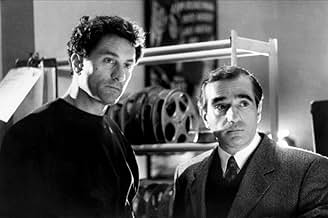CALIFICACIÓN DE IMDb
6.5/10
10 k
TU CALIFICACIÓN
Al regresar a Hollywood en 1951 después de trabajar en Francia, un director de cine se encuentra de frente con el macartismo.Al regresar a Hollywood en 1951 después de trabajar en Francia, un director de cine se encuentra de frente con el macartismo.Al regresar a Hollywood en 1951 después de trabajar en Francia, un director de cine se encuentra de frente con el macartismo.
- Dirección
- Guionista
- Elenco
- Premios
- 2 premios ganados y 2 nominaciones en total
Roxann Dawson
- Felicia Barron
- (as Roxann Biggs)
- Dirección
- Guionista
- Todo el elenco y el equipo
- Producción, taquilla y más en IMDbPro
Opiniones destacadas
This is a fairly good movie. It provides a compelling dramatic struggle and captures the paranoia of an era. However, like many Hollywood movies, it strives more to create a dramatic story than an accurate one.
This movie was originally to be based on the life of blacklisted writer/director Abraham Polonsky (Force of Evil, Body and Soul). Polonsky was working in France at the time of the HUAC hearings and a friend called to tell him not to come back or he'd be called to testify. He deliberately came back for the express purpose of telling HUAC where they could stick it. This is a good story as an anecdote, but not a great story for a movie.
The one place in which this movie (and many other movies) softens the history is by making the protagonist politically neutral. It is certainly true that many people accused were not communists or had only attended a meeting out of curiosity, but this is not true for everybody. Many of these people were devout socialists. As Polonsky has said on occasion "During the Great Depression, anybody with a brain considered Communism. The Capitalist system was BROKE. Communism looked like a smart bet." While many of these people reconsidered as the nation returned to prosperity, a large number did not.
Most of the famous Hollywood Ten were still believers in socialism when they were blacklisted. There is no evidence that any of them were spies for the Soviet Union-- many of them had already learned that the USSR was not the socialist paradise they dreamed of-- but they did believe in the writings of Mark and Engels. It is also true that they placed socialist themes in their films. They created gangsters who only cared about money, families screwed over by greedy real estate brokers and poor saps who put it all in the stock market.
However, none of this was illegal. They had every right to believe in whatever politics they chose to. They had every right to create these films-- and their movies seemed to have a resonance with the audience. They're lives and careers were destroyed because they held political beliefs that some viewed as threatening.
I also want to point out that Elia Kazan was not the model for this film. Elia Kazan has been repeatedly condemned by Polonsky and others who were blacklisted. He chose to name names and to allow the HUAC to bully him. I don't condemn him for this like other people. As this movie shows, so much was on the line for people who HUAC sets their sights on. Kazan cracked. He failed to be a hero, when the time came. This doesn't mark him a coward, merely something less than a hero. "On the Waterfront," while not a direct explanation of his actions, is an excellent look at his state of mind around that time.
While yes, I have not spent much time reviewing this movie, I felt it necessary to set the record straight about history.
This movie was originally to be based on the life of blacklisted writer/director Abraham Polonsky (Force of Evil, Body and Soul). Polonsky was working in France at the time of the HUAC hearings and a friend called to tell him not to come back or he'd be called to testify. He deliberately came back for the express purpose of telling HUAC where they could stick it. This is a good story as an anecdote, but not a great story for a movie.
The one place in which this movie (and many other movies) softens the history is by making the protagonist politically neutral. It is certainly true that many people accused were not communists or had only attended a meeting out of curiosity, but this is not true for everybody. Many of these people were devout socialists. As Polonsky has said on occasion "During the Great Depression, anybody with a brain considered Communism. The Capitalist system was BROKE. Communism looked like a smart bet." While many of these people reconsidered as the nation returned to prosperity, a large number did not.
Most of the famous Hollywood Ten were still believers in socialism when they were blacklisted. There is no evidence that any of them were spies for the Soviet Union-- many of them had already learned that the USSR was not the socialist paradise they dreamed of-- but they did believe in the writings of Mark and Engels. It is also true that they placed socialist themes in their films. They created gangsters who only cared about money, families screwed over by greedy real estate brokers and poor saps who put it all in the stock market.
However, none of this was illegal. They had every right to believe in whatever politics they chose to. They had every right to create these films-- and their movies seemed to have a resonance with the audience. They're lives and careers were destroyed because they held political beliefs that some viewed as threatening.
I also want to point out that Elia Kazan was not the model for this film. Elia Kazan has been repeatedly condemned by Polonsky and others who were blacklisted. He chose to name names and to allow the HUAC to bully him. I don't condemn him for this like other people. As this movie shows, so much was on the line for people who HUAC sets their sights on. Kazan cracked. He failed to be a hero, when the time came. This doesn't mark him a coward, merely something less than a hero. "On the Waterfront," while not a direct explanation of his actions, is an excellent look at his state of mind around that time.
While yes, I have not spent much time reviewing this movie, I felt it necessary to set the record straight about history.
Upon reading through 20 or so of the last reviews of "Guilty by Suspicion" it dawned on me that the majority of the reviewers are only vaguely familiar with the history associated with the film. Robert De Niro's DAVID MERRILL is an almost direct representation of real-life director ELIA KAZAN, known for such great films as "A Streetcar Named Desire" and "On the Waterfront". Only the names have been changed, but the main points of KAZAN's struggle are all intact. Even long-time friend Arthur Miller and wife Marilyn Monroe make an appearance (under different names, of course).
The story depicted in this film is not only perfectly representational of the black list era Hollywood, but is actually perfectly factual and accurate down to the small details. Reviewers should really do more research before "guessing" at what they just saw.
The story depicted in this film is not only perfectly representational of the black list era Hollywood, but is actually perfectly factual and accurate down to the small details. Reviewers should really do more research before "guessing" at what they just saw.
The merit of this film is that it portrays the mechanism, the mentality and the impact on human character of what might very well be any communist regime there ever was in a stunningly perfect way (as a person grown up in a socialist country, believe me - I know!) - only here represented by people who are supposed to prevent communism from spreading! A great comment on human nature - whether intended or not is less important. If I didn't know better, I'd believe this was a Hollywood remake of some film about Stalin's 30:s purges or Polish repressions against the right wing combatants in the 50:s. Solid performance from De Niro, supported by a talented cast. Martin Scorsese appears in a cameo that must be one of the most extensive in his acting career.
The film Guilty by Suspicion showed the effects of the Hollywood blacklist in true-to-life form. Not only did it deal with how friendships and families were affected during this period, but it also showed how other American's, such as teachers, were also blacklisted. Blacklisting was not only a Hollywood occurrence.
Those interested in communism in Hollywood will find the screenplay exciting and interesting, as there are hints of actual transcripts from the House Committee on Un-American Activities scattered throughout the movie. I've watched it at least three times, and I never get bored, I just pick up more and more of the realities of this time period.
The movie is not meant to be used as a way to research this time period. It is a statement movie. It is a statement about the evilness of the red scare. It is not pro-communist, but it is pro American freedom of expression.
Guilty by Suspicion is a great educational movie that is supported by a great cast, and great subplots!
Those interested in communism in Hollywood will find the screenplay exciting and interesting, as there are hints of actual transcripts from the House Committee on Un-American Activities scattered throughout the movie. I've watched it at least three times, and I never get bored, I just pick up more and more of the realities of this time period.
The movie is not meant to be used as a way to research this time period. It is a statement movie. It is a statement about the evilness of the red scare. It is not pro-communist, but it is pro American freedom of expression.
Guilty by Suspicion is a great educational movie that is supported by a great cast, and great subplots!
Some Americans today may never have heard of Senator Joseph McCarthy and McCarthyism. McCarthyism is the practice of making accusations of subversion or treason without proper regard for evidence. The term refers to U.S. senator Joseph McCarthy (R-Wisconsin) and has its origins in the period in the United States known as the Second Red Scare, lasting from the late 1940s through the 1950s. It was characterized by heightened political repression and a campaign spreading fear of communist influence on American institutions and of espionage by Soviet agents. After the mid-1950s, McCarthyism began to decline, mainly due to the gradual loss of public popularity and opposition from the U.S. Supreme Court led by Chief Justice Earl Warren. The Warren Court made a series of rulings that helped bring an end to McCarthyism.
The movie "Guilty by Suspicion" takes place in Hollywood during the height of the Second Red Scare. The movie focuses on David Merrill (Robert De Niro) though he is indicative of many Hollywood personnel affected by the Communist witch hunting.
David, by all indications, was a gainfully employed movie director that was in constant demand. He would have been able to stay gainfully employed so long as he told the F.B.I. what they wanted to hear. And they wanted to hear that certain friends of David's were Communists. David, valuing friendship over finances, opted to keep quiet about any of his friends activities. For that, David was put on the Hollywood blacklist.
"Guilty by Suspicion" is a weighty movie. We get an up close and personal look at what McCarthyism was doing to people's lives. Now I know that some of you may be saying, "Who cares? It was Hollywood." To that I would say that the Constitution never put zoning restrictions on who it applied to. The Constitution didn't have a Hollywood exemption in it and the U.S. government was trampling all over people's Constitutional rights. If they didn't have enemies within the U.S. they were certainly making them.
The movie "Guilty by Suspicion" takes place in Hollywood during the height of the Second Red Scare. The movie focuses on David Merrill (Robert De Niro) though he is indicative of many Hollywood personnel affected by the Communist witch hunting.
David, by all indications, was a gainfully employed movie director that was in constant demand. He would have been able to stay gainfully employed so long as he told the F.B.I. what they wanted to hear. And they wanted to hear that certain friends of David's were Communists. David, valuing friendship over finances, opted to keep quiet about any of his friends activities. For that, David was put on the Hollywood blacklist.
"Guilty by Suspicion" is a weighty movie. We get an up close and personal look at what McCarthyism was doing to people's lives. Now I know that some of you may be saying, "Who cares? It was Hollywood." To that I would say that the Constitution never put zoning restrictions on who it applied to. The Constitution didn't have a Hollywood exemption in it and the U.S. government was trampling all over people's Constitutional rights. If they didn't have enemies within the U.S. they were certainly making them.
¿Sabías que…?
- TriviaMartin Scorsese portrays a fictional director called "Joe Lesser". This character is based on director Joseph Losey, who left Hollywood in the 1950s rather than face the HUAC examinations.
- ErroresThere is a Milwaukee Braves baseball pennant on the wall of Merrill's son's room. This film takes place in 1951 and 1952. The Braves didn't move to Milwaukee from Boston until 1953.
- Citas
David Merrill: [to the Blacklist Committee] Fuck them!
- Bandas sonorasStraighten Up and Fly Right
Written by Nat 'King' Cole and Irving Mills
Performed by Nat 'King' Cole
Courtesy of Capitol Records, Inc.
By arrangement with CEMA Special Markets
Selecciones populares
Inicia sesión para calificar y agrega a la lista de videos para obtener recomendaciones personalizadas
- How long is Guilty by Suspicion?Con tecnología de Alexa
Detalles
Taquilla
- Presupuesto
- USD 13,000,000 (estimado)
- Total en EE. UU. y Canadá
- USD 9,480,198
- Fin de semana de estreno en EE. UU. y Canadá
- USD 2,278,290
- 17 mar 1991
- Total a nivel mundial
- USD 9,480,198
- Tiempo de ejecución1 hora 45 minutos
- Color
- Mezcla de sonido
- Relación de aspecto
- 1.85 : 1
Contribuir a esta página
Sugiere una edición o agrega el contenido que falta


